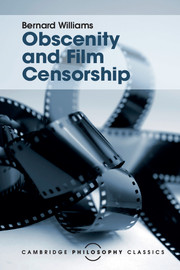2 - The present law
from Part 1 - Background
Published online by Cambridge University Press: 05 November 2015
Summary
2.1 The statute which has been at the centre of our review is the Obscene Publications Act 1959. There had of course been law about obscenity before that Act, but it was in fact the first statute to lay down the offence of publishing obscene articles. Before 1959, obscenity offences rested on the common law, which meant that the law had been established and developed by the courts. We deal in Appendix 1 with the way in which the body of law on obscenity came into being and developed, the origins of law on related matters, and the details of what the present law provides. In this chapter, we shall bring out the main features of present law and how they came to be as they are, and shall discuss how they have been interpreted and applied.
The “tendency to deprave and corrupt”
2.2 The common law offence of obscene libel was first established in 1727, but does not appear to have been frequently prosecuted until the nineteenth century. It was not until 1868 that the definitive test of obscenity was laid down in Chief Justice Cockburn's judgment in R v Hicklin, in which he defined obscenity, in the now celebrated phrase, as the “tendency to deprave and corrupt those whose minds are open to such immoral influences and into whose hands a publication of this sort may fall”. That test remained as the basis of common law prosecutions and was eventually adopted, with some modifications, as the statutory definition of obscenity when the 1959 Act was enacted, and when plays, by the Theatres Act 1968, and films were later brought within the scope of statutory control on obscenity.
2.3 This famous test—the deprave and corrupt test, as we shall call it—has, as we shall show, brought a certain confusion into the interpretation of the law. The confusion does not stop there, however, for the deprave and corrupt test is not the only test which English law applies in deciding what is obscene. It does not, for example, apply to material which is banned from importation under the Customs Acts. Those Acts prohibit articles which are “indecent or obscene”, but that description is not further defined by the statute. The same phrase appears in the statutes prohibiting the transmission of certain material through the post and the display of material in public places.
- Type
- Chapter
- Information
- Obscenity and Film CensorshipAn Abridgement of the Williams Report, pp. 14 - 29Publisher: Cambridge University PressPrint publication year: 2015



